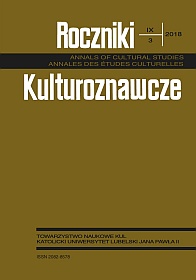The Book of Job as a Drama: Interpretation Possibilities
Abstract
The article examines an interpretation possibility to read the structure of the Book of Job as a drama structure. It shows that some of the apparent paradoxes and contradictions in the text can be understood as an inner logic of a drama. The seeming incoherence of narrative Prolog and Job's later statements can be easily reconciled by following through the dramatic cause-effect sequences and seeing the events as happening in permanently changing present. The dramatic approach enables to see the meeting between God and Satan as an unsuccessfully attempt to make a bet. Deprived from omniscient narrator’s perspective, the drama shows various attitudes, without pointing directly which is the best one. Full of paradoxes and contradictory statements, the main hero’s style can be compared with a modern stream of consciousness. The culminating point of the drama shows a durable change in Jobs posture and leads to surprising changes on a metalinguistic level.
References
Aked, Charles. The divine drama of Job. Edinburgh: T. & T. Clark, 1913.
Cuddon, John. A Dictionary of Literary Terms. Harmondsworth: Penguin Books, 1984.
Geeraerts, Dirk. “Caught in a web or irony: Job and his embarassed God.” In Job 28. Cognition in Context, edited by Ellen Van Wolde, 37–57. Leiden, Boston: Brill, 2003.
Gelber, Sholome Michael. Job stands up: The Biblical text of the book of Job arranged for the theater. New York: Union of American Hebrew Congregations, 1975.
Iwański, Dariusz. Hiob dla odważnych. Toruń: Wydawnictwo Naukowe Uniwersytetu Mikołaja Kopernika, 2011.
Jakubiec, Czesław. Księga Hioba. Wstęp, przekład z oryginału, komentarz, ekskursy. (Pismo Święte Starego Testamentu VII/1). Poznań, Warszawa: Pallottinum, 1974.
Jung, Carl Gustav. “Aswer to Job.” In The Collected Works of C. G. Jung. Vol. 11: Psychology and Religion: West and East, edited by Gerhard Adler and Richard Francis Hull. New Jersey: Bollingen Series XX, 1958.
Kallen, Horace Meyer. The book of Job as a Greek tragedy. (A Dramabook, t. 19). New York: Hill and Wang, 1959.
Kierkegaard, Søren. Bojaźń i drżenie. Choroba na śmierć. Translated by Jarosław Iwaszkiewicz. Warszawa: Państwowe Wydawnictwo Naukowe, 1982.
Klinger, Bernhard. Im und durch das Leiden lernen. Das Buch Ijob als Drama. (Bonner biblische Beiträge, t. 155). Hamburg: Philo, 2007.
Mooney, Edward F. “Kierkegaard’s Job’s Discourse: Getting Back the World.” International Journal for Philosophy of Religion 34 (1993), no. 3: 151-169.
Ravasi, Gianfranco. Hiob: Dramat Boga i człowieka, part 1. Translated by Barbara Rzepka. (Zgłębiać Biblię). Kraków: Wydawnictwo Salwator, 2004.
Ravasi, Gianfranco. Hiob: Dramat Boga i człowieka, part 2. Translated by Krzysztof Stopa. (Zgłębiać Biblię). Kraków: Wydawnictwo Salwator, 2005.
Scholnick, Sylvia Huberman. Lawsuit drama in the book of Job. Ph.D. Diss. Brandeis University. University Microfilms, 1976.
Slawik, Jakub. Hiob przed Bogiem. Warszawa: Chrześcijańska Akademia Teologiczna, 2010.
Słownik terminów literackich, edited by Janusz Sławiński. Wrocław, Warszawa, Kraków, Gdańsk, Łódź: Zakład Narodowy im. Ossolińskich, 1988.
Szepe, Agata. “Odwołuję, co powiedziałem.” Teatr 2018, no. 5: 54–58.
Świderkówna, Anna. Rozmowy o Biblii. Warszawa: Wydawnictwo Naukowe PWN, 1994.
Walls, Alfred. The oldest drama in the world. The Book of Job. Arranged in dramatic form with elucidations. New York, Cincinnati: Hunt & Eaton; Cranton & Stowe, 1891.
Whedbee, William. The Bible and the comic vision. New York: Cambridge University Press, 1998, 2008.
Wisse, Maarten. Scripture between Identity and Creativity: A Hermeneutical Theory Building upon Four Interpretations of Job. Utrecht: Ars Disputandi, 2003.
Whybray, Norman. Job. Sheffield, England: Sheffield Phoenix Press, 2008.
“The book of Job.” In The English Standard Version Bible. Containing the Old and New Testaments with Apocrypha. New York: Oxford University Press, 2009.
Yariv, Sheila.שילה, יריב. ספר איוב - ניתוח תיאטרוני. עבודת גמר (מ"א)--אוניברסיטת תל אביב,. תל אביב: חמו"ל 2005.





